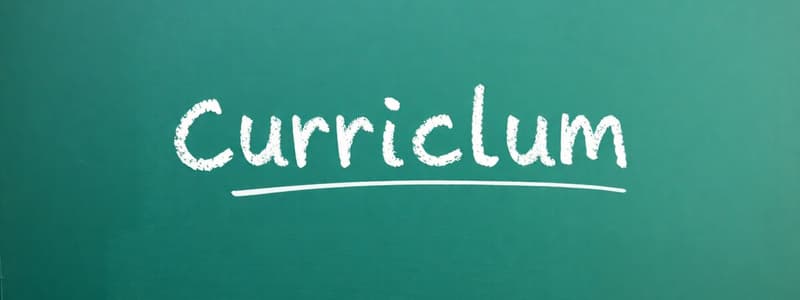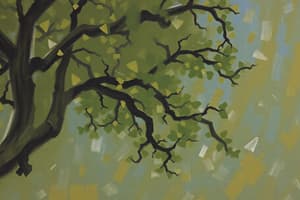Podcast
Questions and Answers
What did Joseph Schwab emphasize regarding curriculum?
What did Joseph Schwab emphasize regarding curriculum?
- Curriculum should be based on policies.
- Curriculum should consist only of knowledge from disciplines. (correct)
- Curriculum should emphasize practical skills over theory.
- Curriculum is a reflection of community needs.
How do Caswell and Campbell define curriculum?
How do Caswell and Campbell define curriculum?
- All experiences children have under teacher guidance. (correct)
- A document outlining educational objectives.
- A set of skills students must acquire.
- A series of activities planned for students.
What is the view of Marsh and Willis on curriculum?
What is the view of Marsh and Willis on curriculum?
- Curriculum includes all planned classroom experiences. (correct)
- Curriculum is only focused on academic subjects.
- Curriculum is a measurement of student performance.
- Curriculum should exclude experiential learning.
According to Bobbit, what is the purpose of the curriculum?
According to Bobbit, what is the purpose of the curriculum?
What aspect of curriculum does David G. Armstrong focus on?
What aspect of curriculum does David G. Armstrong focus on?
What is meant by curriculum being a dynamic process?
What is meant by curriculum being a dynamic process?
How is the curriculum organized in college according to the content provided?
How is the curriculum organized in college according to the content provided?
What is a common view of traditional curriculum?
What is a common view of traditional curriculum?
What is one disadvantage of defining curriculum as a product?
What is one disadvantage of defining curriculum as a product?
Which aspect defined in the content allows for broader experiences in learning?
Which aspect defined in the content allows for broader experiences in learning?
According to the document, what is a common misconception about traditional curriculum?
According to the document, what is a common misconception about traditional curriculum?
What is a key characteristic of the progressive point of view on curriculum?
What is a key characteristic of the progressive point of view on curriculum?
What is one of the aims of defining curriculum as a program of study?
What is one of the aims of defining curriculum as a program of study?
What is a primary advantage of defining curriculum in concrete terms?
What is a primary advantage of defining curriculum in concrete terms?
Which of the following best defines the hidden curriculum?
Which of the following best defines the hidden curriculum?
What do Arthur Bestor's beliefs about curriculum suggest should be prioritized?
What do Arthur Bestor's beliefs about curriculum suggest should be prioritized?
Flashcards are hidden until you start studying
Study Notes
Definition of Curriculum
- Curriculum refers to the planned and structured learning experiences provided to students.
- It encompasses subjects, learning objectives, teaching methods, and assessments.
Types and Purposes of Curriculum
- Curriculum as a product: A tangible document outlining courses, content, and learning objectives.
- Curriculum as a program of study: A sequence of courses or learning experiences designed to achieve specific educational goals.
- Curriculum as intended learnings: The knowledge, skills, and attitudes that teachers aim to impart to students.
- Curriculum as experiences of the learner: The actual learning experiences that students engage in, both planned and unplanned.
- Hidden curriculum: Unintentional lessons or messages learned through school culture, routines, or interactions.
Curriculum as a product
- Advantages: Provides concrete direction for planning, development, and assessment.
- Disadvantages: Can be limiting, assumes all outcomes are predictable, and may separate learning objectives from the learning process.
Curriculum as a program of study
- Advantages: Provides a structured framework for instruction, aligns with traditional education models, and facilitates management of learning.
- Disadvantages: May not account for individual learning styles, focuses more on content mastery than individualized learning, and may limit student choice and personalization.
Curriculum as intended learnings
- Includes goals, content, concepts, generalizations, and outcomes.
Curriculum as experiences of the learner
- Emphasizes the activities (planned and unplanned) students engage in.
- Advantages: Focuses on the student learning experience, allows for broader experiences, and promotes meaningful learning when aligned with student interests and needs.
- Disadvantages: Can be abstract and complex, and may be difficult to encompass all learning experiences.
Hidden Curriculum
- Refers to unintentional learning that occurs in school settings.
- May include lessons about social behavior, power dynamics, and cultural expectations.
Traditional Views of Curriculum
- View curriculum as a set of subjects or subject matter designed for student learning.
- Emphasize the importance of structured content, such as grammar, rhetoric, logic, mathematics, and foundational intellectual disciplines.
Progressive View of Curriculum
- Emphasize the learner's experiences and the process of learning.
- View curriculum as a dynamic and evolving process that caters to individual needs and interests.
Key Thinkers on Curriculum
- John Dewey: Emphasized the importance of reflective thinking and learning from experience. Viewed curriculum as the "total learning experience" shaped by action and application.
- Caswell and Campbell: Defined curriculum as "all the experiences children have under the guidance of teachers."
- Marsh and Willis: View curriculum as all planned and unplanned experiences within the classroom.
- Smith, Stanley, and Shores: Defined curriculum as a sequence of potential experiences aimed at disciplining students in ways of thinking and acting.
- Bobbit: Saw curriculum as a series of experiences that prepare students for adulthood, focusing on practical skills.
- David G. Armstrong: Defined curriculum as a master plan for selecting content and organizing learning experiences to change and develop learners' behavior and insights.
Curriculum Evolution
- Curriculum is a dynamic process that undergoes purposeful, planned, and progressive development to improve and adapt to evolving educational needs.
Studying That Suits You
Use AI to generate personalized quizzes and flashcards to suit your learning preferences.




